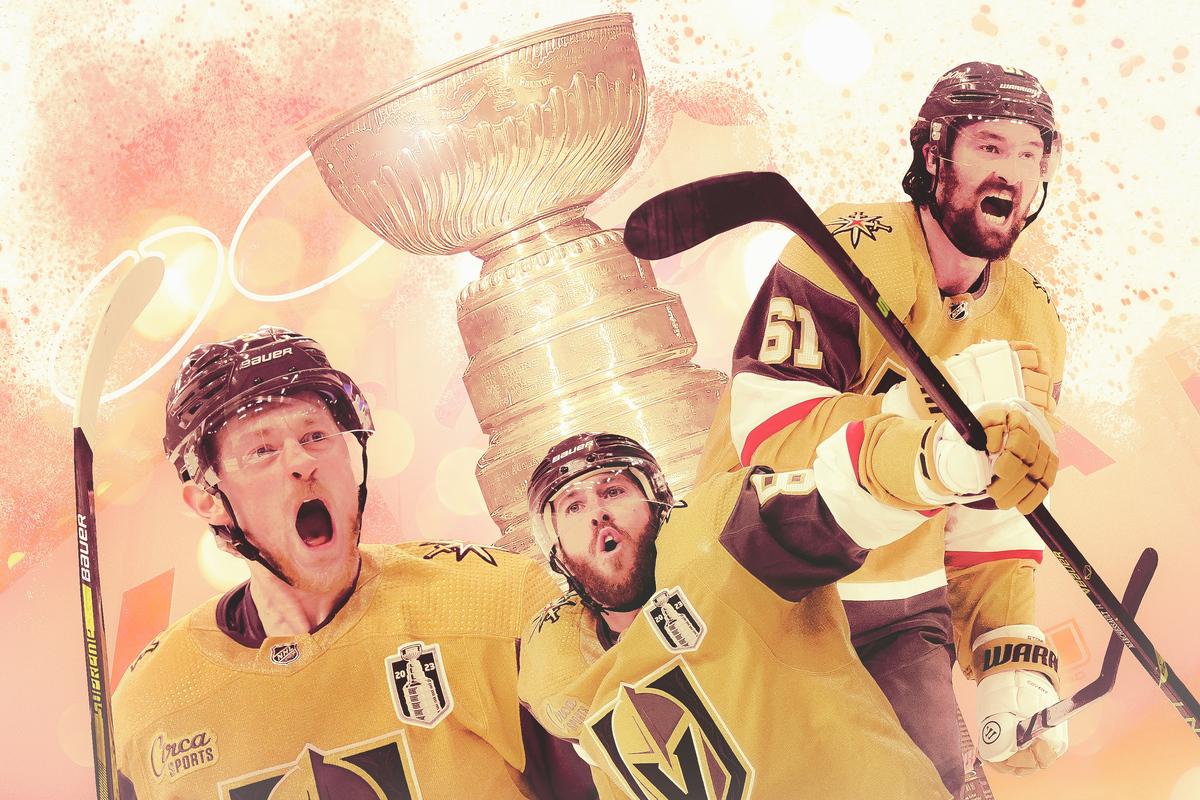
A few minutes after Vegas Golden Knights captain Mark Stone lifted his team’s first Stanley Cup, he sounded almost indistinguishable from the kind of people you overhear at the city’s airport following a weekend of merriment with their besties or broheims.
“One of the craziest feelings I ever had, and being with my best friends makes it even more special,” Stone screamed into TNT’s microphones, his voice carrying the recognizable rasp of anyone who has conquered Sin City. “I can’t even describe the feelings in my stomach right now; it’s everything you can imagine.” And that was before he hit up the buffet.
Stone—whose Game 5 hat trick was capped off by an empty-net goal that took several silly, skee-ball-style attempts to get just right—wasn’t the only one channeling the loopy can-you-believe-this-shit vibe of Las Vegas. This is a city, after all, where folks are swept up, by design, in swooping hospitality and sweet spectacles; a place where anyone can get up to something big on a Tuesday night. And in the Golden Knights’ 9-3 Cup-clinching win over the Florida Panthers, Stone’s whole team played the same way as their captain, galloping around the building until they were hoarse.
Playing in his first full season in Vegas following a trade and a controversial neck surgery, center Jack Eichel finished Game 5 with three assists and a few bold dipsy-doodles for good measure. His linemate Jonathan Marchessault, one of the players left from Vegas’s inaugural expansion season in 2017-18, earned the Conn Smythe Trophy as playoff MVP following 13 goals and 11 assists in 21 games. Goaltender Adin Hill, who at one point this season was the team’s fourth-string netminder, capped off an unexpected and impressive postseason run with big saves throughout the game that set the tone for his team.
“Playoffs in three, Cup in six,” the ever-forthright Golden Knights owner Bill Foley told News 3 Las Vegas shortly before the team’s debut in 2017, explaining how many seasons he felt it ought to take his brand-new franchise to hit its full stride. “No excuses. That’s the standard.”
Vegas met that standard and then some on Tuesday night, capping off an era of near-excellence that has defined the team’s entire existence. And they did so both by being lucky, and by aggressively seeking to play their own odds.
The Golden Knights started off ahead of Foley’s schedule, reaching not only the playoffs but also the Cup final in their first year of existence. They surged into, and then well through, that 2018 postseason with a roster of players that had one heck of a case for a legit “nobody believes in us” ethos—most of them had been objectively discarded by their previous teams in the expansion draft. During practices early that first year, players bonded over the chips on everyone’s shoulders, singling out the player(s) that used to be on each upcoming opponent and pumping them up during practices. A nickname spawned in a group chat—“The Golden Misfits”—became an entire team identity.
And somehow, in the years that followed, the Golden Knights remained annual contenders, bobbing and weaving like a boxer on fight night. They made back-to-back runs to the NHL semifinals in the pandemic-truncated 2020 and 2021 seasons. They doubled down in some spots—aggressively pursuing players like Stone, defenseman Alex Pietrangelo, and Eichel—and displayed coolheaded sell discipline in others. Goalie Marc-André Fleury, for example, had been a bedrock player in Vegas’s first Cup run, and a face of the fledgling franchise. But the team moved in a different direction in 2021, not letting emotion get in the way of the cold hard stats around goalie longevity.
Even though just six of the original Misfits remain, the core of this team—and the franchise’s roster-constructing ethos—was born that first year. While many of the team’s original players were selected directly in the expansion draft, others were part of the many pot-sweetening trades that Vegas made with other franchises.
Going into the expansion draft, the majority of predictive analysis and scuttlebutt was focused on the first order of transactional operations: Which players would teams probably leave exposed for Vegas to sweep up? And which of those players would Vegas pick? But where then-general manager (and current head of hockey operations) George McPhee really thrived was in finding the tangents to all that. Knowing that not all “unprotected” players on each NHL roster were of equal importance to their current teams, the Golden Knights exploited and extracted those small differences to their advantage. Nice player you’ve got there. It would be a real shame to lose him. Maybe we could agree to leave him alone … for a price.
The Florida Panthers, for example, convinced the Knights to trade for forward Reilly Smith (and his expensive contract) by leaving Marchessault exposed in the expansion draft, seemingly as something of a thank-you. Six years later, Smith would be the second player to be handed the Stanley Cup from Stone. Then he turned and handed it to Marchessault. “What I’ve always said about Jonathan Marchessault: He seizes big moments,” Vegas general manager Kelly McCrimmon said before Game 5. “He has always had a knack for that.”
All this success the Knights have had has been, depending on one’s rooting interest, either a wholesome story about a plucky franchise with a heart of gold making good, or an annoying example of the perceived capriciousness of the modern NHL. On one hand, the Golden Knights are a team that opens its practices to any old fan, and a group that locals will always remember as being one of the first major sports franchises to go all-in on the region. (As I noticed when I visited the team during this preseason, the best way to tell whether the car cutting you off is being driven by a tourist or a townie is to see whether it has one of the now-ubiquitous Golden Knights license plate frames.)
On the other hand, fans of other teams—teams that have floundered for many decades, for example—tend to grumble that the 2017 expansion draft rules were too friendly to the Knights, and therefore unfair. I recently saw one Oilers fan on Twitter refer to the Golden Knights as “The Bettman Golden Childs,” nomenclature that will stay with me for life. (To be fair, the Seattle Kraken had the same expansion draft rules in 2021, but came away with quite different results. Fool me once, etc.)
It wasn’t just about the draft, though. Going into this year’s playoffs, some bristled at the way the Golden Knights managed an injury loophole that enabled them to enter the postseason technically above the salary cap. This wasn’t specific to Vegas, however: the loophole, which the NHL Board of Governors has declined more than once to tighten up, has also been enjoyed by teams like the Lightning over the years. Ultimately, the Golden Knights were simply pretty savvy within the shifty parameters with which they were presented. You might say that the team’s brass parsed the odds, identified the value plays, and separated the suckers from their assets, just like millions of people do for fun and profit up and down the Vegas Strip day and night.
One of Las Vegas’s most ambitious gambles was on the 26-year-old Eichel, who was drafted second overall by the Buffalo Sabres to rousing fanfare in 2015, and spent six increasingly contentious seasons with his original team before agitating for a trade in 2021 amidst a medical dispute. Last summer he was joined in Vegas by head coach Bruce Cassidy, who was also hitting the town under auspicious circumstances.
Cassidy’s coaching career had brought him from the humble surroundings of the Jacksonville Lizard Kings of the ECHL to a long stint with the Providence Bruins of the AHL, and he eventually would make the Cup final behind the bench of the Boston Bruins in 2019, falling in seven games to St. Louis. (That Blues team featured not only Pietrangelo but also Ivan Barbashev, who played alongside Eichel and Marchessault this season.) Cassidy was let go after a first-round playoff loss in 2022—only to watch the Bruins set a new NHL points record without him this season. In an interview with The Athletic, Cassidy admitted to feeling a little relieved when the Panthers beat the Bruins earlier in these playoffs in the first round—not for his sake, but “for my kids not having to hear about ‘Oh, if your dad had done a better job …’”
Now, the most annoying thing his kids will hear from their friends all summer is “When can I see the Cup?” And similarly, Eichel’s performance this year has ensured that the narrative around him won’t always be focused on his personal career lows. “I started to really enjoy coming to the rink again,” Eichel told reporters on the ice after the game, his face flushed with exertion and exultation, describing the fresh start he made in Vegas.
Around him, his teammates smiled through their shaggy playoff beards and hoisted children with “DADDY” on the backs of their tiny jerseys and pointed into the Las Vegas crowd. Phil Kessel, who began the season with a record-setting ironman streak and ended it as a healthy scratch, was nevertheless riding high, holding a child that looked exactly like him and telling reporters, “You guys said I couldn’t win, and now I’m a three-time champ. Remember that.” Marchessault, who began his career as an undrafted player and now continues it as a Cup-winning MVP, was picked up on a TNT microphone telling one of his teammates: “In my vision we didn’t win the cup in the white jerseys. We won it in the gold.”
On this night, though, all the gold inside the building and all the bright lights of the Strip beyond had nothing on the silver of the Stanley Cup. Flags fly forever, which is another way of saying that what happens in Vegas stays in Vegas—whether the odds are good or the goods are odd, and regardless of what the next deck of cards may bring.

